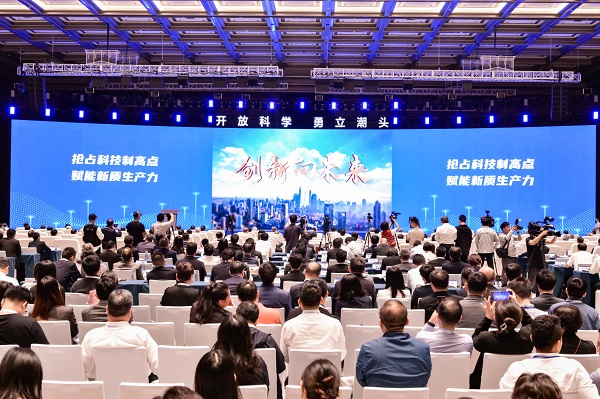Province acting as spearhead for innovation
Forum serves as high-end resource platform for technological advancement in Guangdong
The Greater Bay Area Science Forum 2024, jointly hosted by the governments of Guangdong province and the special administrative regions of Hong Kong and Macao, concluded in Nansha district, Guangzhou, on Monday.
This year marks the fifth anniversary of the release of the Outline Development Plan for the Guangdong-Hong Kong-Macao Greater Bay Area.
During the forum's opening ceremony, Wang Weizhong, governor of Guangdong, said that over the past five years, the Greater Bay Area has continuously deepened the alignment of rules and mechanisms, strengthened cooperation in innovative resources and platforms, and comprehensively promoted its transformation into an international sci-tech innovation center and a high-level talent hub.
Looking ahead, Wang said that Guangdong will thoroughly implement the innovation-driven development strategy, accelerate the construction of a complete innovation chain, and advance the province's development as a leader in education, technological innovation, and talent cultivation.
He emphasized the importance of optimizing the innovation environment, fostering a comprehensive innovation support system, promoting the mutual enhancement of industry and technology, and developing new quality productive forces tailored to local conditions.
Wang warmly invited scientists and innovative talents from around the world to come to Guangdong and the Greater Bay Area to embark on entrepreneurial endeavors and share in the promising future of sci-tech innovation.
This year's forum featured an opening ceremony, a main forum, 14 subforums, and five special activities. The main forum invited Nobel laureates, academicians from China and abroad, and other internationally influential scientists to deliver keynote speeches.
The subforums focused on cutting-edge topics such as brain science, brainlike intelligence technology, future materials, aerospace, marine science, and green and low-carbon technologies, aiming to support the Greater Bay Area's future industrial development.
A notable event during the forum was a matchmaking session between the Chinese Academy of Sciences and Guangdong, where over 240 sci-tech achievements from 52 CAS institutions were showcased. This led to the on-site contract signing of 12 major scientific cooperation projects set to be implemented in the Greater Bay Area.
Hou Jianguo, president of the CAS, praised the Greater Bay Area for its high level of openness, strong economic and innovation vitality, and hopes that the forum would serve as an opportunity to advance original innovation and tackle key core technologies, fostering a robust innovation ecosystem in the Greater Bay Area.
The forum has provided a high-end resource platform for technological innovation in Guangdong, which is an essential economic powerhouse and a leading province in sci-tech innovation in China.
The province's regional innovation capability has ranked highest in the country for eight consecutive years, with the Shenzhen-Hong Kong-Guangzhou technology cluster's innovation index holding the second spot globally for five consecutive years in the World Intellectual Property Organization's rankings.
Guangdong is working on the mutual enhancement of industry and technology, accelerating the construction of a comprehensive innovation chain that includes basic research, technological breakthroughs, achievement transformation, technological finance and talent support.
Gong Guoping, a senior official of the Guangdong Department of Science and Technology, said the province has placed increasing importance on basic research in recent years, establishing diversified investment and funding systems for related projects.
Xu Yigang, a CAS academician and researcher at the Guangzhou Institute of Geochemistry, said that "Guangdong has always valued technological innovation, encouraging and supporting scientists to explore uncharted territories of innovation."
"Thanks to the innovation-friendly atmosphere created by the province, I have been able to focus on basic scientific research and achieve certain results in some frontier fields," he said.
Additionally, Guangdong actively develops and promotes advanced and applicable technologies, promptly applying them to specific industries.
Since August 2018, the province has been advancing core technology research in nine major fields, covering 12 batches of 754 projects.
Currently, it is conducting targeted scientific research to meet the evolving requirements of 20 national innovative industrial clusters and eight industrial clusters, each capable of generating over 1 trillion yuan ($138.12 billion) in annual production output value. This focused approach positions Guangdong as the driver at the forefront of the development of strategic emerging industries and future sectors.
To expedite the industrialization of new technologies, Guangdong has been proactively building supply-demand matching platforms and constructing an innovation ecosystem with compatible incentives.
Leveraging the Greater Bay Area National Center of Technology Innovation, which has been operating since August 2022, as the main platform, the province is establishing an innovation hub that integrates scientific research and achievement transformation. The hub has already attracted four innovation platform projects and gathered teams with over 600 members.
Enterprises form the foundation for developing new quality productive forces. In Guangdong, enterprises contribute about 90 percent of research institutions, researchers, R&D funding, and invention patent applications.
Guangdong boasts over 76,000 high-tech enterprises, having the highest number in the country for eight consecutive years.
By improving the decision-making consultation mechanism for technological innovation, Guangdong supports enterprises in building high-level innovation platforms and encourages them to lead or participate in national and provincial scientific research tasks.
Guangdong's status as a prominent province in sci-tech innovation stems from its bold exploration in accelerating the construction of a comprehensive innovation-supporting mechanism.
For example, the province's sci-tech innovation regulation, which came into effect on Oct 1, introduces several innovative institutional measures to promote sci-tech innovation from multiple perspectives throughout the entire process.
This groundbreaking regulation includes several pioneering initiatives, such as the establishment of a provincial fund for basic research in local legislation, the proposal for a distinct management system for the entire process of duty-related sci-tech achievements transfer, the support for universities to establish a discipline adjustment mechanism aligned with national strategic needs, and the proposal of a novel mechanism to stimulate the transformation dynamics of new-type research and development institutions in local legislation.

The Greater Bay Area Science Forum 2024 is held in Nansha district of Guangzhou, Guangdong province. CHINA DAILY
All rights reserved. Presented by China Daily









